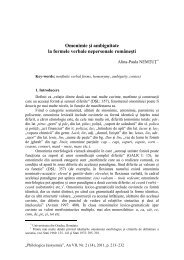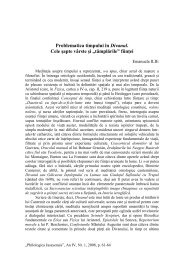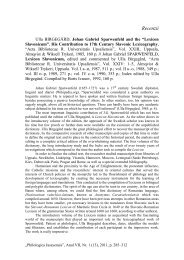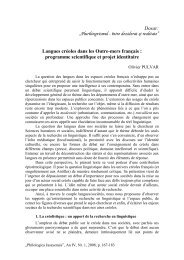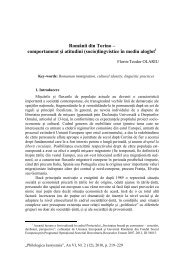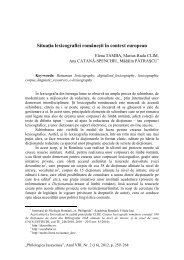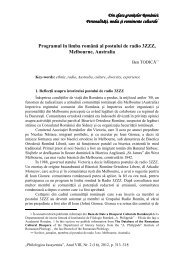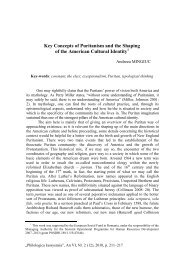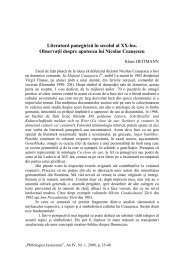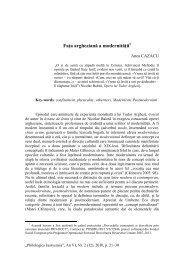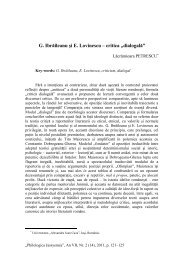O sutÄ de ani de cartografie lingvisticÄ româneascÄ - Philologica ...
O sutÄ de ani de cartografie lingvisticÄ româneascÄ - Philologica ...
O sutÄ de ani de cartografie lingvisticÄ româneascÄ - Philologica ...
You also want an ePaper? Increase the reach of your titles
YUMPU automatically turns print PDFs into web optimized ePapers that Google loves.
Adrian PORUCIUC<br />
control. Such was the period in which non-Germ<strong>ani</strong>c natives of East-Central Europe<br />
became familiar with Germ<strong>ani</strong>c juridical terms of the bann family (with basic<br />
me<strong>ani</strong>ngs such as ‘proclamation, prohibition, <strong>de</strong>cree’).<br />
A territory with the name of Banat (< Medieval Latin banatus) survived<br />
through the Middle Ages into mo<strong>de</strong>rn times exactly in the Middle-Danubian area<br />
once covered by the kingdom of the Gepids. Therefore one can assume that<br />
Latinized forms such as banus and banatus were already in use among speakers of<br />
Late Vulgar Latin (or, already, of Proto-Romance) in areas controlled by the Gepids.<br />
The ancestors of the Serbians and the Croatians, when they moved south, must have<br />
borrowed (from the pre-Slavic substratum of the Carpathian-Danubian area) Old<br />
Germ<strong>ani</strong>c terms based on bann- and band-, which subsequently became bases for<br />
peculiar medieval Serbian and Croatian juridical terms (that is, for the lexical family<br />
of banta ‘molestia’), which have clear cognates in Rom<strong>ani</strong>an.<br />
After having adopted a series of bann- and band- terms directly from Old<br />
Germ<strong>ani</strong>c intru<strong>de</strong>rs, the Italians also learned, most probably from their Croatian<br />
neighbors, about a title ban (cf. It. bano, inclu<strong>de</strong>d in the Battisti/ Alewio dictionary).<br />
The Hungarians did something similar, after the conquest of their new homeland;<br />
that is, they borrowed the source-words of their bán and bánt from their Slavic and<br />
Romance subjects and/or neighbors. Later, after Hungarian bán had <strong>de</strong>veloped<br />
me<strong>ani</strong>ngs that reflected an advanced-feudal hierarchy, the Hungarian title un<strong>de</strong>r<br />
discussion could act as a reinforcement of ban terms in all the languages of the<br />
Hungarian-controlled part of Central-Southeast Europe. But, as <strong>de</strong>monstrated in the<br />
whole of Poruciuc 2008, the reinforcement un<strong>de</strong>r discussion could account neither<br />
for the archaic me<strong>ani</strong>ngs of Rom<strong>ani</strong>an terms such as bănat ‘accusation’, bănui ‘to<br />
suspect’ and bântui ‘to punish’, nor for the mass of Rom<strong>ani</strong>an Ban and Banu family<br />
names, which reflect a pre-Hungarian situation, in which ban did not <strong>de</strong>signate a<br />
feudal high rank, but just the position of a local magistrate.<br />
Rom<strong>ani</strong>an material is dominant in Poruciuc 2008 not because the author<br />
knows that material better. The main reason is that, besi<strong>de</strong>s the abundant onomastic<br />
arguments, the unity of the Rom<strong>ani</strong>an terms belonging to the ban-bănat-băni-bănuibântui<br />
lexical family is most coherent of all, as they all still reflect an archaic<br />
juridical system, which can be easily referred to the early medieval one reflected by<br />
German Bann and by English ban and banns, as well as a mass of Old Germ<strong>ani</strong>sms<br />
to be found in West Romance 26 . And it is quite obvious that those Rom<strong>ani</strong>an words<br />
(which cannot be explained as Hungarian loans, either phonetically or semantically)<br />
are closest to what Old Germ<strong>ani</strong>c bann stood for, before it came to refer to<br />
advanced-feudal realities in various Central-West European medieval states.<br />
No doubt, several aspects of the complex relationship between the original<br />
me<strong>ani</strong>ngs of the Old Germ<strong>ani</strong>c terms of the bann family and the me<strong>ani</strong>ngs of<br />
Rom<strong>ani</strong>an words such as bănat, bănui and bântui (all three originally referring to<br />
notions such as “judgement” and “punishment”) should be further clarified in the<br />
future. For the time being, I am sure of at least one major thing, namely of the Old<br />
26 Poruciuc 2008 gives a whole series of Old Germ<strong>ani</strong>sms recor<strong>de</strong>d in West Romance languages.<br />
Here are only a few of those examples: Old French ban ‘proclamation, judgement’, bannir ‘to sentence,<br />
to ban’, banal ‘communal’; Provençal bandó ‘permission’; Sp<strong>ani</strong>sh bando ‘solemn edict’; Italian<br />
bannire (with a variant bandire) ‘to make a solemn public announcement’.<br />
190



